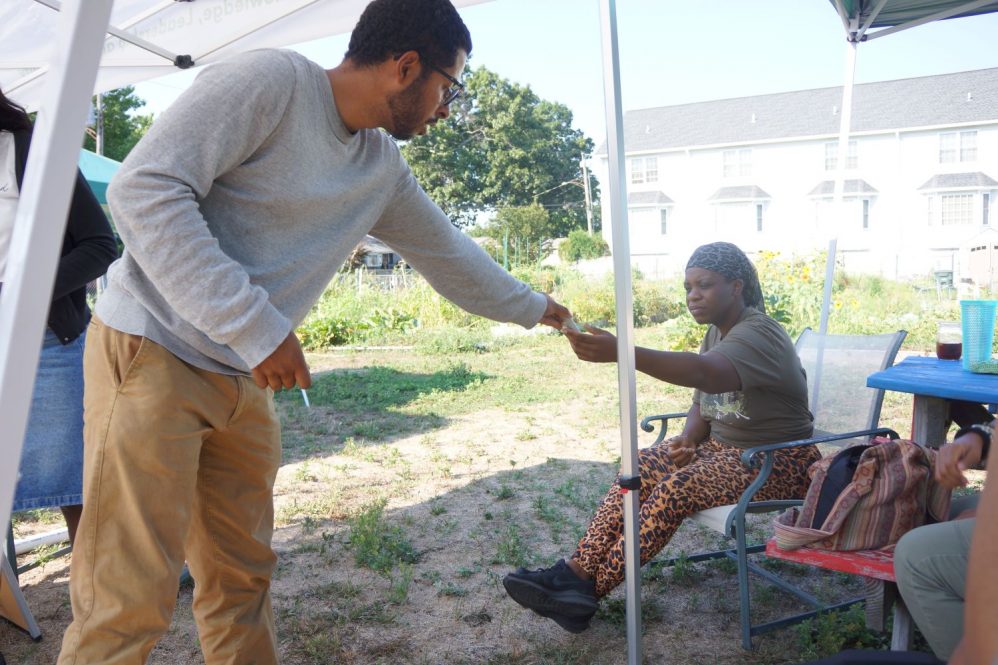Land is a fixed resource, and while we cannot create more, it is possible to use available land and infrastructure more efficiently. Connecticut farmers, especially those in urban and peri urban locations, consistently cite land access as one of their biggest challenges.
A UConn Extension team is expanding urban agriculture in Connecticut through a new project focusing on vacant lot activation and peri-urban farmland access linking, led by Jacqueline Kowalski, an associate extension educator based in UConn Extension’s Bethel office.
Connecticut has five cities – Bridgeport, Stamford, New Haven, Hartford, and Waterbury – with over one hundred thousand residents, and 88% of the state’s population lives in urban areas. Meanwhile, the number of urban agricultural operations is also increasing, and there is more interest in beginning new operations. Urban agriculture’s growth is driven by increasing food security through local production, and a greater interest among more people in connecting with the land and growing their own food.
“Secure land access is one of the greatest challenges that urban producers grapple with in Connecticut,” Kowalski says. “It is our hope that through this project, municipalities will see urban agriculture as integral to resilient communities and that urban producers can access underutilized space to start and expand their operations.”
Kowalski currently works with urban farmers throughout the state to improve their operations, provide resources, expand agricultural involvement, and increase the number of urban agriculture operations statewide. Urban agriculture benefits include improving food security, contributing to sustainable landscapes, and aiding economic development.
The new project builds upon UConn Extension’s current urban agriculture resources and will conduct a needs assessment with urban farmers on their land needs and the characteristics of vacant lots in urban and peri-urban areas to make them usable.
The group is partnering with local organizations and has a 13-member advisory team working with them. Next, the research results will help the group identify potential land using geospatial analysis, including state and public land parcels. Municipalities and land trust organizations are providing input on these parcels, currently focusing on urban areas in western and southwestern Connecticut.
Existing resources and training available through UConn Extension’s urban agriculture programs include site selection and modification and then working with cities and navigating zoning requirements. Programs provide education on intensive vegetable and flower production, season extension, business management, and product marketing. Complementary resources are available through UConn Extension’s food safety program and Center for Land Use Education and Research (UConn CLEAR).
The project’s final phase is connecting urban farmers with the identified land and ensuring agricultural-friendly leases. The team’s goal is expanding or starting 20 urban farming operations. Partner organizations include the Councils of Governments (COGs), land trusts, and Land For Good, a nonprofit focused on the future of farming in New England. Team members will use existing resources, including CT Farm Link, a site managed by Connecticut Department of Agriculture, to assist farmers and land use officials.
“UConn Extension has over a century of experience supporting and strengthening food systems in Connecticut,” says Amy Harder, associate dean for UConn Extension. “We are excited to continue that commitment by helping farmers find success in urban areas, creating more opportunities for all families to have access to Connecticut Grown foods and products.”
Connecticut has a heightened awareness about urban agriculture and land access because of the Northeast region’s population density. UConn Extension’s urban agriculture program, including this initiative, is building infrastructure for a more resilient and vibrant agricultural and food system. The broader impacts include helping other regions develop stronger urban agriculture programs through improved land access.
This work is supported by the National Institute of Food and Agriculture, U.S. Department of Agriculture, under award number 2024-70019-42200.
This work relates to CAHNR’s Strategic Vision area focused on Ensuring a Vibrant and Sustainable Agricultural Industry and Food Supply.
Follow UConn CAHNR on social media



